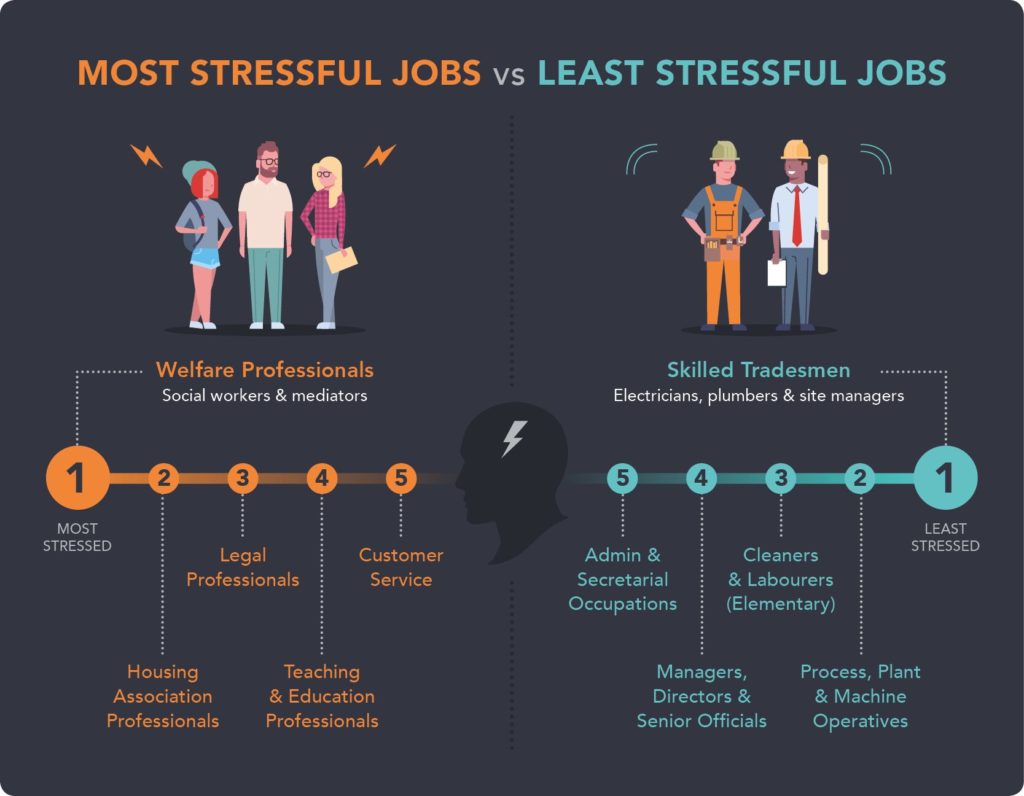
Struggling with stress? You’re not alone. 59% of UK workers have experienced work stress and 54% had trouble sleeping because of it.
Most of us endure stress at some point in our careers. Long hours, overtime and a heavy workload can all be key contributors to our work-related stress. But how stressful is your job compared to the rest of the UK? With the average Briton spending 3,507 days at work over their lifetime, Workwear Giant has uncovered just how the UK’s occupations compare – analysing earnings, unpaid overtime and stress.
Workwear Giant’s investigation has revealed the most and least stressful jobs. The research has indicated that the more you earn, the more you seem to suffer from stress, with the professional category most affected and jobs such as skilled trade and plant processing, the least.

The data is surprising – careers that are considered aspirational, such as teaching and welfare occupations, are in fact amongst the lowest overall job quality. So, how exactly was the job quality index calculated?
We’ve investigated each occupation’s average earnings, stress level and unpaid overtime. Then scored these out of 5 against the UK’s national average, with 1 being the lowest score.
As of March 2019, the national averages are as stands:
- National average wage – £24,000 per annum
- National average cases of stress – 1,320 cases per 100,000 people
- National average unpaid overtime – 7.5 hours a week
So how does your job compare? Read on to find out.
Uncovered: The Most Stressful Jobs
Teaching & Education Professionals
- Earnings – £25,692 p/a (£1,692 more than the national avg) = 3/5
- Stress – 3,020 reported cases of stress per 100,000 people (1,700 cases more than the national avg) = 2/5
- Unpaid overtime – 12.5 hours a week (5 hours more than the national avg) = 1/5
- Total Score = 6/15
Welfare Professionals
- Earnings – £34,200 p/a (£10,200 more than the national avg) = 4/5
- Stress – 4,080 cases of stress per 100,000 people (2,760 cases more than the national avg) = 1/5
- Unpaid overtime – 8.6 hours a week (1.1 hours more than the national avg) = 2/5
- Total Score = 7/15
Housing Association Professionals
- Earnings – £24,012 p/a (£12 more than the national average) = 3/5
- Stress – 3,050 cases of stress per 100,000 people (1,730 cases more than the national avg) = 2/5
- Unpaid overtime – 8.6 hours a week (1.1 hours more than the national avg) = 2/5
- Total Score = 7/15
Legal Professionals
- Earnings – £69,992 p/a (£45,992 more than the national avg) = 5/5
- Stress – 3,040 cases of stress per 100,000 people (1,720 cases more than the national avg) = 2/5
- Unpaid overtime – 9.6 hours a week (2.1 hours more than the national avg) = 2/5
- Total Score = 8/15
Customer Service
- Earnings – £20,735 p/a (£3,265 less than the national avg) = 2/5
- Stress – 2,770 cases of stress per 100,000 people (1,450 cases more than the national avg) = 3/5
- Unpaid overtime – 0 hours a week (7.5 hours less than the national avg) = 5/5
- Total Score = 10/15
Revealed: The Least Stressful Jobs
Managers, Directors & Senior Officials
- Earnings – £43,425 p/a (£19,425 more than the national avg) = 5/5
- Stress – 1,200 cases of stress per 100,000 people (120 cases less than the national avg) = 4/5
- Unpaid overtime – 9.2 hours a week (1.7 hours more than the national avg) = 1/5
- Total Score = 10/15
Admin & Secretarial Occupations
- Earnings – £23,207 p/a (£793 less than the national avg) =2/5
- Stress – 1,310 cases of stress per 100,000 people (10 cases less than the national avg) = 4/5
- Unpaid overtime – 0 hours a week (7.5 hours less than the national avg) = 5/5
- Total Score = 11/15
Cleaners & Labourers (Elementary)
- Earnings – £20,030 p/a (£3,970 less than the national avg) = 2/5
- Stress – 780 cases of stress per 100,000 people (540 cases less than the national avg) = 5/5
- Unpaid overtime – 0 hours a week (7.5 hours less than the national avg) = 5/5
- Total Score = 12/15
Process, Plant & Machine Operatives
- Earnings – £25,480 p/a (£1,480 more than the national avg) = 3/5
- Stress – 630 cases of stress per 100,000 people (690 cases less than the national avg) = 5/5
- Unpaid overtime – 0 hours a week (7.5 hours less than the national avg) = 5/5
- Total Score = 13/15
Skilled Tradesmen
- Earnings – £27,279 p/a (£3,279 more than the national avg= 3/5
- Stress – 600 cases of stress per 100,000 people (720 cases less than the national avg) = 5/5
- Unpaid overtime – 0 hours a week (7.5 hours less than the national avg)= 5/5
- Total Score = 13/15
15.4 Million Working Days Lost Due to Work-Related Stress
The impact workplace stress is having on the UK is enormous, so much so, that a huge 15.4 million workdays were lost due to it. The effects can be seen across all industries, but particularly those working in professional occupations with an average 2,090 cases of workplace stress per 100,000 people. This is damaging not only to the people suffering but for employers too. It’s believed employee turnover is at an all-time high, which is worrying considering 46% of UK workers have searched for a new job because of stress.
Only 6% of employees in the UK have felt no stress at work – this begs the question, which jobs are the least stressed? Workwear Giant’s investigation has indicated that jobs in the skilled trades are the least stressed with just 600 cases of workplace stress per 100,000 people. Following closely behind is process, plant & machine operatives with just 630 cases of workplace stress per 100,000 people.
What Causes Workplace Stress?
Studies have found the main cause of stress at work is an employee’s workload which can be affected by tight deadlines, being too busy and having too much responsibility.
In terms of the most stressful jobs, each has a great deal of responsibility, with many people relying on them to carry out their role. It’s no wonder workers in these occupations suffer. It also seems the number of hours you work can contribute to your stress level too, causing work overload and exhaustion.
How to Identify and Manage Workplace Stress
Sometimes it’s easier for someone else to recognise stress in you, that’s why it’s even more important for employers and managers to be able to identify it. The most common signs of stress are:
- Worrying – i.e. constantly asking questions or being concerned about upcoming deadlines.
- An inability to concentrate
- Having difficulty making decisions, especially with simple ones.
- Being less creative
- Getting irritated easily
- Being tearful
- Having sleep problems
- Suffering from headaches
If you are an employer or manager and believe a team member is suffering from stress, it’s vital to talk to the employee and find out the cause of their stress. Once you have identified the problem you can then find a solution that can be agreed on, most issues can always be solved and there is always help if you need it, such as a GP or talking to a charity like Mind. As well as this you should encourage your team to talk to a manager if they believe they’re suffering from stress or becoming mentally unwell.